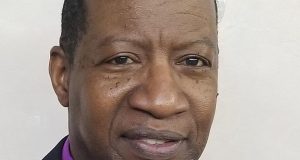By Dr. Leon Barrett
Education Specialist
 I suggested in a previous commentary, “Parental Involvement In The Education Of Their Children Could Become A Test Of Will” (Pride News, August 17, 2017), that as a parent, regardless of ethnicity, religion and nationality, it is not unusual to have negative interactions with some school personnel. This is so because, among other things, educational institutions are places of competing interests, of contradictions, and places of complex relationships.
I suggested in a previous commentary, “Parental Involvement In The Education Of Their Children Could Become A Test Of Will” (Pride News, August 17, 2017), that as a parent, regardless of ethnicity, religion and nationality, it is not unusual to have negative interactions with some school personnel. This is so because, among other things, educational institutions are places of competing interests, of contradictions, and places of complex relationships.
Then in “Understanding Education Bureaucracy Vital For More Meaningful Parental Participation” (Pride News, November 2, 2017), I pointed out that the school environment can be hostile and unwelcoming for some parents.
“Some educators regard the school as their power domain or fiefdom. So school personnel are most comfortable when the outsiders (parents) act in a subservient, subordinate way, doing what they are told. … It is not well and good when parents question this part of the school culture. A parent-teacher conference then, is not a dialogue between partners when parents seek information on how their children are being educated. It is not well and good when parents offer suggestions to improve the education process. Such behavior is an affront to some school personnel,” I offered.
Then there are issues with student behavior and performances.
“As parents then, you enter the school at your own risk. Regardless of who you are, when you enter the domain, some educators treat you as if you do not belong, and you enter as an uninformed intruder. You are talked down to, and even when legitimate questions are asked and concerns raised, a defensive stance is taken,” I pointed out.
Sometimes the conflicts between parents and school personnel get played out in the interruption of a student’s learning. Although unprofessional, unethical and show lack of caring, some educational personnel take out their frustrations and anger on the relevant students by not providing the best education for these students, or even worse.
As conflicts are inevitable, public district school boards generally have conflict resolution guidelines and policies to regulate interpersonal relationships, in the hope that conflicts will be resolved, with the best positive outcomes for students, who are supposed to be at the centre of any education system.
So what are some of the ways parents can approach the conflict situation?
In “Understanding Education Bureaucracy Vital For More Meaningful Parental Participation” (Pride News, November 2, 2017), I also indicated that the education bureaucracy illustrates a kind of chain of command. Parents can and should make use of this system.
If the conflicts are with the frontline personnel, parents should start the conflict resolution process with them. If you are not satisfied with the outcome you can address the issues with the institution’s administration.
In failing to get satisfaction, parents can then approach the superintendent responsible for the supervision of the particular educational institution. Parents should be aware though, that given the dynamics of the educational institution, administrative personnel often protect their own.
It is therefore advisable not to approach any educational personnel alone. As much as possible, have at least one other adult accompany you. Chances are, when you show up for your meetings, there may be several education personnel awaiting you. You certainly do not want to be alone with them.
Another layer in the conflict resolution process is the school trustee, who is supposed to represent you on behalf of the school board. This may not happen though. But it is not hopeless. There are two other options open to parents — the Human Rights Commission and the College of Teachers, in the case of Ontario at least.
Even though it might involve a long process, these bodies will carry out a thorough investigation and take appropriate action.
The threat and use of the Human Rights Commission and the College of Teachers are enough to unnerve many educational personnel. Few want to see and read their names and action taken against them, printed in the “Blue Pages” of the magazine “Professionally Speaking”.
I encourage parents to use the options available to them to resolve conflicts. I also encourage them to be reasonable in their dealings with the educational personnel, as they would like the educational personnel to be reasonable with them. The underlying intent of the conflict resolution process is to have the best positive outcomes for the students. It should not be for retaliation and retribution.
As a practising educator, I have personally experienced incidents of parents and their children falsely accusing me of saying and doing things to them. I have had a few cases of school administrators putting me on trial, for saying and doing things of which I was not guilty. I have seen colleagues accused and punished for things of which they were eventually proven innocent. In one case, a teacher was accused and punished for doing something physical to a student on a professional development day, when the teacher was at school. The students had a school holiday so was not at school, when the incident allegedly occurred.
In light of these situations, my encouragement to many teachers was to be careful about what they say to and any physical contacts they have with students. This was particularly true with male teachers. There seems to be no natural justice. One is often accused and then punished until he or she can prove his or her innocence.
So yes, parents should not compromise pursuing and making sure they get justice. But at the same time, they should make sure they do not use illegitimate means, such as false accusations, to get it.
Dr. Barrett is a retired Peel Region District Board teacher and educator. Write to him at pridenews@bellnet.ca.
 Pride News Canada's Leader In African Canadian & Caribbean News, Views & Lifestyle
Pride News Canada's Leader In African Canadian & Caribbean News, Views & Lifestyle





